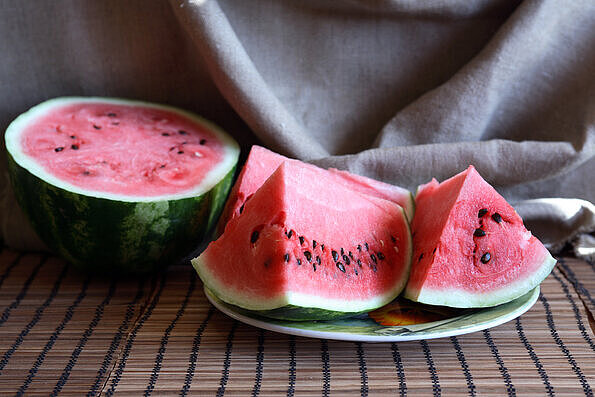Honeydew melon

Honeydew melons are delicious and refreshing fruits that are particularly popular in summer. But are they also suitable for dogs? In this article, you'll find out what honeydew melons are, what advantages and disadvantages they have for your four-legged friend and how best to feed them.
What is honeydew melon?
The honeydew melon is a commercial type of sugar melon (Cucumis melo) and is characterized by its yellow fruit. It belongs to the gourd family and originally comes from Africa or Asia. Honeydew melons do not ripen, i.e. they must be harvested when ripe. They have a smooth or slightly wrinkled skin and greenish to orange-colored flesh. The flesh is juicy and sweet and contains many seeds in the center.
Honeydew melons are healthy as they contain a lot of water, vitamin C, vitamin A, folic acid, potassium and magnesium. They are also low in calories (approx. 50 kcal per 100 g) and fat (approx. 0.1 g per 100 g), but high in fructose (approx. 8 g per 100 g).
Benefits of honeydew melon for dogs
Honeydew melon can have several benefits for dogs when fed in moderation. For example
- Honeydew melon can help your dog cool down on hot days and quench their thirst as it contains a lot of water.
- Honeydew melon can strengthen your dog's immune system as it is rich in vitamin C. Vitamin C protects the cells from free radicals and promotes wound healing.
- Honeydew melons can improve your dog's eyesight as they contain a lot of vitamin A. Vitamin A is important for cell growth and the visual process.
- Honeydew melon can help your dog's digestion as it contains fiber. Fiber stimulates intestinal activity and can prevent constipation.
Disadvantages of honeydew melon for dogs
Honeydew melon can also have some disadvantages for dogs if it is fed too much or too often. For example
- Honeydew melon can cause diarrhea or abdominal pain if your dog is sensitive to fructose or has an intolerance.
- Honeydew melon can contribute to obesity or diabetes if your dog eats too much of it or is already overweight or diabetic. Honeydew melon has a high glycemic index, which means that it raises blood sugar levels quickly.
- If the dog eats the rind or seeds, it can choke or suffer an intestinal blockage. The shell is hard and indigestible and the seeds can get stuck in the intestines.
How do I give my dog honeydew melon?
If you want to give your dog honeydew melon, there are a few things you should bear in mind:
- Choose a ripe and fresh honeydew melon. You can recognize a ripe honeydew melon by its yellow color, its sweet smell and the fact that it gives slightly when you squeeze it.
- Wash the honeydew melon thoroughly to remove dirt and pesticides.
- Cut the melon open and remove the rind and seeds. The skin and seeds are inedible for dogs and can be dangerous.
- Cut the flesh into small pieces or puree.
The honeydew melon is a yellow variety of the sugar melon and belongs to the pumpkin family. It contains a lot of water, vitamin C, vitamin A, folic acid, potassium and magnesium, but also a lot of fructose. Honeydew melon can provide benefits to dogs in moderation by hydrating in hot weather, boosting the immune system, aiding digestion and improving vision. However, excessive consumption can lead to diarrhea, obesity or diabetes, and the rind and seeds of the melon should be avoided.
If you notice any signs of hypersensitivity or poisoning in your dog, you should see your vet immediately. We are not a substitute for a vet, but we try to be as accurate as possible. Every dog reacts differently and we recommend you get a second opinion or consult your vet if in doubt.
Stay healthy and take good care of your four-legged friend!😊
Similar to Honeydew melon
Watermelon is a type of plant from the gourd family that originally comes from Africa. The fruit has a thick, green rind and juicy, red flesh with black or white seeds. Watermelon consists of around...
The galia melon, also known as the sugar melon, is a variety of the genus Cucumis and belongs to the pumpkin family. It is characterized by its round shape, yellow-green skin and juicy, light green...
Cantaloupe melon belongs to the gourd family and is a popular refreshment, especially in the summer months. This type of melon is characterized by its net-like skin and bright orange, juicy flesh,...
The Charentais melon is a variety of cantaloupe melon, known for its small to medium size, green striped rind and bright orange, incredibly sweet flesh. This type of melon is particularly popular in...



